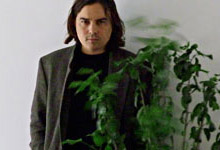
Tracks
Moonface: "Fast Peter"
(2011)
By Brent Ables | 3 August 2011
When last year’s Dreamland EP was released for free online, it seemed the epitome of a for-fans-only side project. Written and released between two muscular full-lengths from Sunset Rubdown and Wolf Parade, it was a reticent, cryptic, slow-building exercise in economy that offered the listener no easy avenues for interpretation. Now that Krug has released the Organ Music Not Vibraphone Like I’d Hoped LP, however, the project begs to be reinterpreted in the greater context of his prolific career.
Strangely, what Krug presents himself to be doing with Moonface—his first solo venture since the earliest Sunset Rubdown recordings—is ceding a degree of authorial authority over his own work to that work. Letting the instruments themselves dictate the music, in other words, and letting his lyrical personae speak for him. This abdication of creative control is the common thread linking the Dreamland EP with Organ Music‘s first single, “Fast Peter.” And for attentive fans, it’s not a surprising move. On Sunset Rubdown’s Dragonslayer (2009), Krug vacillated between declarations of slow-burning artistic constancy and pleas for release from the burden of creation: “I’d like to have you navigate to hills where no musicians live,” he pleaded on one song, before eventually deciding to “fight the good fight” for a couple more years. Moonface allows him to reconcile these conflicting impulses. Krug’s left the other musicians behind, but he hasn’t yet thrown his trumpet down to go on empty-handed; instead, he lets the trumpet “go on ahead for awhile.” Krug tells us as much with the blunt titles of these works: he started with “marimba and shit-drums,” but despite his hopes, ended up with “Organ Music.” And yes, obviously Krug was the one holding the mallets on the Dreamland EP, but the album belonged to those marimbas.
If this abdication-of-authority thing seems far-fetched, just give “Fast Peter” another listen, since it’s all there. First, consider how Krug frames the song’s narrative. He’s reporting a conversation that he had with a friend while they were high on, y’know, drugs. So the story isn’t even his, and what’s more, he was in an impaired state when he himself was told the story. There was a similar distancing mechanism on the Dreamland EP: there we got a vicarious look at Krug’s subconscious, while now we are tripping with his friend on a balcony. In both cases, Krug conspicuously removes his waking, sober self from the action. Moreover, distance is arguably the central theme of “Fast Peter”: Peter loves this girl, but she is so far away that they only talk on their computers, so eventually he leaves town to go find her. (Hinting at his own withdrawal from the mic, Krug slyly describes Peter’s lover as the “one who sings for him.”) Ultimately, Krug wants nothing more than to let Peter be the hero, and to sit back and cheer him on: “Won’t you win the race for me?”
Having passed the baton to Peter, Krug goes on to let the organ sing for him in the song’s second half. The lush, multilayered arpeggios that propelled the first half drop out along with the beat, and the remainder of the track consists almost entirely of Krug noodling over a swelling drone that serves as the musical link between the two distinct halves of the song. What is remarkable about this final section is that Krug is able to pull off a four-minute organ solo without a whiff of showmanship or ego. What could’ve been four minutes of proggy bloat in lesser hands instead sounds entirely consonant with the mood established in the early part of the song, and in no way feels indulgent or pretentious. As with the rest of the piece, it’s ultimately a testament to Krug’s increasingly formidable abilities as a songwriter: even when he steps out of the spotlight, he still shines brighter than just about anyone else who takes the stage these days.





